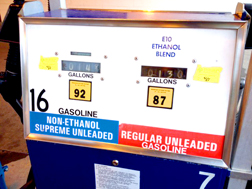E10 Better Than Straight Gas: Important Findings Or Junk Science?
 New research appears to show that pure gasoline--known as G100 or E0--is more corrosive to various engine parts than is E10. At least that's the claim of a post on the website of the Urban Air Initiative, a group that works to promote ethanol use to reduce or eliminate the adverse effects on public health of what are called the aromatic compounds in gasoline.
New research appears to show that pure gasoline--known as G100 or E0--is more corrosive to various engine parts than is E10. At least that's the claim of a post on the website of the Urban Air Initiative, a group that works to promote ethanol use to reduce or eliminate the adverse effects on public health of what are called the aromatic compounds in gasoline.
Published in June, the post alludes to research results presented by ICM Inc. and the institute at a meeting of the ASTM, an international group that develops and publishes standards, including those for vehicle fuels.
According to the post, the research involved "extensive testing done on fuel lines, gas containers, and plastic components" that were bathed in both E0 and E10 fuel for extended periods.
The higher percentage of aromatics in the E0 -- 25.6 percent versus 20.6 percent in E10 gasoline -- produced more damage over time to the components than in the E10, it says.
The Urban Air Institute has as its goal to boost the percentage of ethanol in the fuels mix for U.S. vehicles, to counter adverse health effects of the aromatic compounds in gasoline. It is partially funded by agricultural business interests.
There is concern that the science in the study has not been rigorously scrutinized and conclusions from it may be speculative.
The oil industry uses ethanol to raise current gasoline to the minimum octane levels required for sale, a function performed for decades by the now-banned addition of highly toxic ethyl lead.
The EPA does not currently regulate maximum levels of aromatics in gasoline, though it does limit their emission from some industrial sources.
The EPA website lists the known toxicities and adverse health effects of toluene, benzene, and other compounds.
 New research appears to show that pure gasoline--known as G100 or E0--is more corrosive to various engine parts than is E10. At least that's the claim of a post on the website of the Urban Air Initiative, a group that works to promote ethanol use to reduce or eliminate the adverse effects on public health of what are called the aromatic compounds in gasoline.
New research appears to show that pure gasoline--known as G100 or E0--is more corrosive to various engine parts than is E10. At least that's the claim of a post on the website of the Urban Air Initiative, a group that works to promote ethanol use to reduce or eliminate the adverse effects on public health of what are called the aromatic compounds in gasoline.